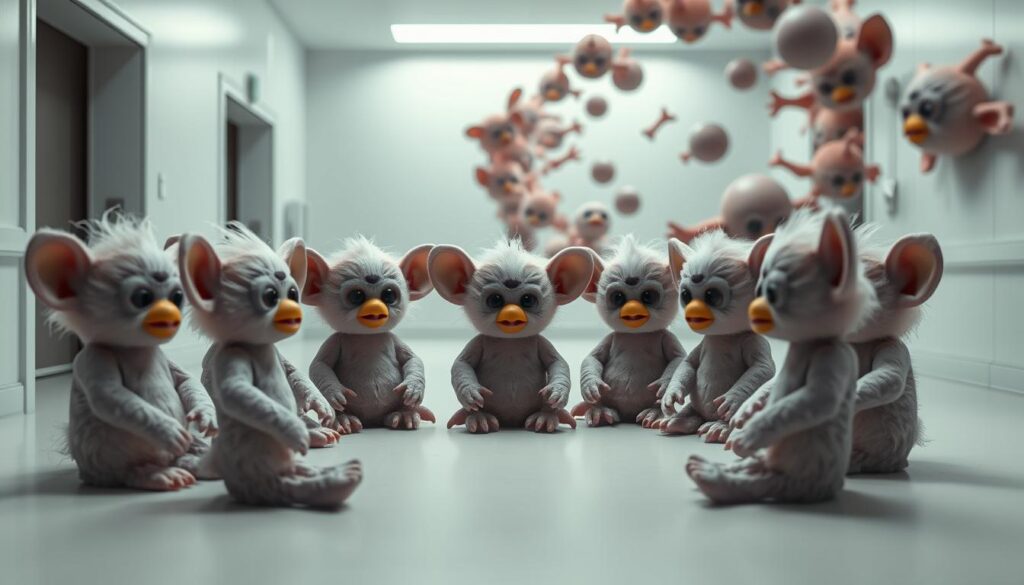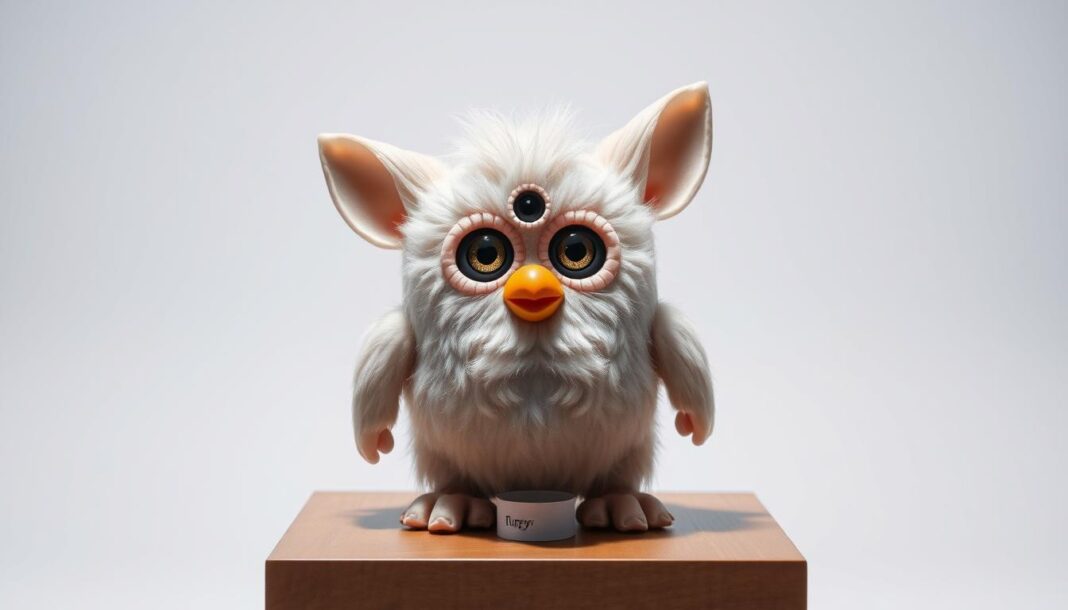Remember the fluffy, talking toys from the ’90s? The Furby was a childhood favorite, selling over 58 million units since 1998. But today, a bizarre twist has taken the internet by storm—the hairless Furby. Stripped of its iconic fur, this unsettling yet hilarious version has become viral content on social media.
Originally designed with soft fur and expressive eyes, this toy now reveals its robotic skeleton in its furless form. Fans call it “peak cursed meme material,” blending nostalgia with modern curiosity. On platforms like Etsy, sellers offer wrinkled, fleshy versions, sparking both fascination and humor.
Why the hype? It taps into today’s love for retro trends and odd collectibles. Whether you find it disturbing or joyful, the hairless Furby proves that even childhood icons can evolve—or devolve—into something wildly unexpected.
Key Takeaways
- The hairless Furby is a rare, viral collectible with a cult following.
- Social media has amplified its appeal as “nightmare fuel” and nostalgic fun.
- Originally a fluffy ’90s toy, it now showcases a tech-revealing, furless design.
- Etsy sellers market it as a quirky, unsettling must-have for collectors.
- Over 58 million Furbies sold since 1998, proving its lasting legacy.
The Surprising Anatomy of a Hairless Furby
Peeling back the layers of nostalgia reveals a surprising mechanical core. Without its fur, the toy’s inner workings—plastic skeletons, infrared sensors, and microchips—become visible. This stripped-down version transforms childhood nostalgia into a tech showcase.
What Lies Beneath the Fluff
Removing the fur exposes a network of gears and circuits. These enable 600+ reactions, from ear wiggles to blinking eyes. Collectors liken it to dissecting vintage toys, where engineering meets artistry.
Engineering Marvel: The Tech Behind the Toy
Newer models (2012+) feature LCD eyes and voice recognition. The original’s simplicity contrasts with today’s interactivity. Yet both share a mechanical soul—proof of decades of innovation.
Comparing Furry vs. Furless Furbies
| Feature | Furry | Furless |
|---|---|---|
| Maintenance | Regular cleaning | Handle exposed tech carefully |
| Aesthetic | Fluffy, playful | Industrial, “microwave-warped” |
| Rarity | Common | Limited editions ($340+) |
For collectors, the furless design is a sign of rarity. It’s a quirky twist on the original’s legacy, blending joy with a dash of surrealism.
The Cultural Phenomenon of Hairless Furbies
The internet has a way of turning childhood icons into bizarre trends. What was once a fluffy companion is now a social media star—sans fur. This shift from toy to collectible reflects a blend of nostalgia and modern humor.

From Childhood Toy to Collector’s Obsession
Millennials are revisiting their childhood favorites, but with a twist. Stripped of its iconic fur, the toy becomes a canvas for creativity. Etsy artists like Devin Gardner have sold over 1,000 custom designs, proving demand is high.
Why the appeal? It’s a mix of:
- Nostalgia: Reconnecting with the past in a quirky way.
- Joy: The absurdity brings unexpected laughter.
- Rarity: Limited editions fuel collector hype.
Social Media’s Role in the Craze
Platforms like Instagram amplify the trend. Accounts like @LongFurbyFam (214K followers) curate bizarre content, turning toys into memes. Think “microwave-warped” Furbies—shareable, surreal, and strangely captivating.
Etsy and other sites transform niche hobbies into lucrative ventures. For many, it’s not just a toy—it’s a lifestyle, a curse, and a meme rolled into one.
The Evolution of Furbies: From Fluffy to Furless
Over the years, Furbies have transformed from cuddly companions to tech-revealing oddities. This journey mirrors toy innovation and cultural shifts, with each redesign marking a new chapter in its life.
Generational Changes in Furby Design
The original 1998 model boasted soft fur and simple mechanics. By 2005, Emoto-Tronic versions added expressive faces. The 2012 reboot introduced LCD eyes and multilingual speech—a sign of advancing tech.
Sales tell the story: 40 million units sold by 2000. Today, Basic Fun’s $160M annual revenue proves enduring demand. Vintage models now fetch $69.99 on Amazon, while limited editions sell out fast.
How Hairless Variants Changed the Game
Stripped of its fur, the toy’s mechanical skeleton became a canvas for creativity. Collectors embraced this “naked” look, turning it into a viral trend. Etsy artists and meme pages fueled its rise.
Key shifts:
- Tech focus: Exposed gears highlighted the toy’s engineering.
- Cultural impact: From Black Friday frenzies to Cyber Monday’s $12.4B sales in 2023.
- Nostalgia: Hasbro’s 1,500 legacy brands revived interest.
Need to turn off your Furby? Even furless models retain their quirky charm—and occasional need for a reset.
Starting Your Own Hairless Furby Collection
Building a unique collection takes time, but the hunt brings pure joy. Rare finds like the “Millennium Edition” can fetch up to $4,500, making them prized treasures for enthusiasts.
Scour Etsy, eBay, and flea markets for hidden gems. Unopened 1998 models sell for $360, while custom furless versions hover around $340. Condition matters—protect exposed tech parts to preserve value.
Avoid holiday markups; prices spike by 122% during peak seasons. Instead, shop year-round for better deals. These quirky pieces spark conversations and blend nostalgia with modern weirdness.
Ready to dive in? Embrace the oddity today. Whether for laughs or investment, these collectibles redefine playful nostalgia. For tips on handling your finds, check our guide on Furby commands.

